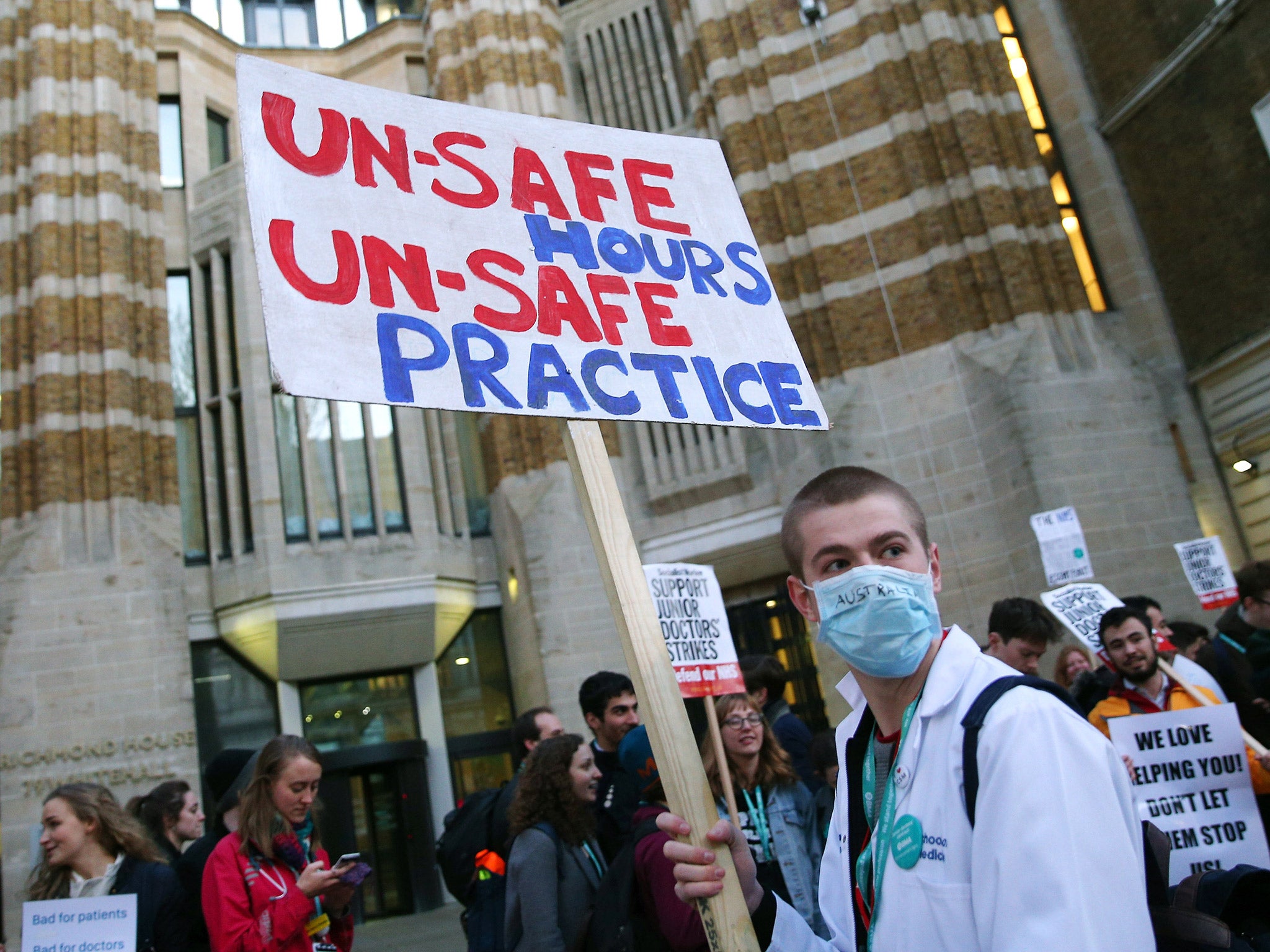The final offer made to junior doctors was too generous – they should stop striking and get on with it
Why should it be such a struggle to get the emergency services to run 24/7? It is here that overtime culture has proved most resilient


You know things have reached a pretty pass in any dispute when the combatants start to invoke the spirit of deceased politicians. But when two men who have reached the top of their political trees also start invoking their own mothers – as Jeremy Corbyn and David Cameron did at Prime Minister’s Questions – well, the possibility of any agreement looks remote indeed.
Yes, after a merciful, but all too brief, period of remission, we are back in the heat of the junior doctors’ dispute. The Labour leader accused the Government of showing bad faith and “misrepresenting” statistics (about hospital deaths at weekends); the Prime Minister returned to his mantra about people not getting sick only on weekdays. Whatever else the Government may be ready to compromise on, it appears not to be a “seven-day NHS”.
And quite right, too.
“Our” NHS is not run for the benefit of the staff, however long they have spent in training, however mountainous their student loans, however arduous and responsible their work. A great many people would probably like to work only Monday to Friday, 9 to 5, especially if highly-paid overtime for additional hours comes virtually guaranteed. But this is not the reality for most people, and there is no reason, when so much in this country now functions 24/7 – with the staff on rotas and little, if any, overtime paid – why it should still be such a struggle to get the emergency services to do the same. Yet it is here the overtime culture has proved most resilient.
There will be those – and I admit to being among them – who saw the final offer to the junior doctors as too generous. By preserving a system of overtime, for Saturdays after 5pm and all Sundays, it leaves in place the idea that doctors can expect to work something like traditional office or factory hours with additional rewards for anything else. Those expectations need to be scotched.
Junior doctors, and their many vocal supporters, have tried to turn the contested statistics about weekend fatalities to their advantage, suggesting that a “cut-price” seven-day NHS would simply raise death rates around the week. Anyone who visits hospitals on weekdays and at weekends, however, will be familiar with the glaring disparity in staffing – at every level, and what sometimes appears to be a surfeit of employees, especially in the least skilled jobs, during standard working hours. There is surely money to be saved here, that could offset the cost of more staff at weekends.
Nor can the junior doctors’ dispute be seen in isolation. Their new contract is just one part – if a large part – of reform of the NHS that is yet to come. If next in line are to be the consultants, for whom the junior doctors are often deputising at nights and weekends, you can understand why the Government might be keen to hold the line.
What occasioned the latest sword-crossing in the Commons was the announcement by the British Medical Association earlier this week that the junior doctors would hold three more days of strikes, and would fight the Health Secretary’s imposition of the new contract through the courts. In the first instance, this means seeking a judicial review.
On precisely what legal grounds the BMA intends to fight is not yet clear. For all the perception that the English judiciary has become more politically engaged in recent years, it is hard to see a judge ruling that an elected government is not within its rights to set the terms of a contract for public sector employees, particular when in line with a manifesto commitment. Going to court is only going to inject more poison into this already toxic dispute.
It is beyond time that the BMA called it a day and recognised that the junior doctors have won as much as they are going to – more than they could have expected at the outset and more, indeed, than may be wise for the future health of the NHS. The BMA’s continued insistence a “safe” seven-day NHS is somehow beyond the country’s means is defeatism of the first order, and really not junior doctors’ call to make. It is the stated policy of an elected government.
That said, the extent to which this dispute has become politicised has made it infinitely harder to resolve. Jeremy Hunt has not just been defending his government’s policy of a seven-day NHS, he has been engaged directly in negotiating the small print of a new contract. This has enabled junior doctors, and the BMA on their behalf, to cast the project as a heartless Tory plot.
The most senior non-politicians – the chief executive of NHS England, Simon Stevens, and the medical director, Sir Bruce Keogh – have both been conspicuously absent from the fray. This may be because, if heads had to roll, the Health Secretary is deemed more dispensable than either of them. But here, perhaps, also lies the key to change. For 10 years or more – most recently in the Conservatives’ 2010 election manifesto – proposals have been mooted to separate the NHS from politics by placing it under an independent board. Policy, such as the creation of seven-day service, and the overall NHS budget would be set by central government, leaving the rest to professionals. Each time, however, a consensus evolved to the effect that the NHS was so integral a part of national life and the sums of money allocated so vast, that there had to be direct political accountability. The scandal at Mid-Staffs augmented that view.
But the downside of the argument is again before us. Junior doctors and a Conservative government at loggerheads; there is talk of relations blighted for a generation. One solution might be for the Government to return to its election manifesto of 2010 and divest itself of managerial responsibility for the NHS. If junior doctors can cast that as a victory, so be it. But there is no reason why the sort of hands-off arrangement that is considered good for the BBC and – increasingly – for schools should not be good for the NHS, too.


Join our commenting forum
Join thought-provoking conversations, follow other Independent readers and see their replies